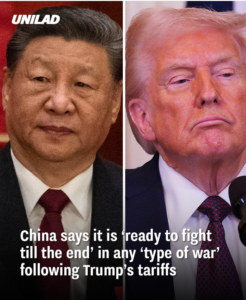China has issued a strong response to former U.S. President Donald Trump’s proposed tariffs, declaring that it is “ready to fight till the end” in any “type of war.” The bold statement comes amid escalating trade tensions between the world’s two largest economies, signaling that Beijing has no intention of backing down from what could become a prolonged economic conflict.
Trump, who has long been critical of China’s trade practices, recently announced plans to impose significant tariffs on Chinese imports if re-elected. His proposal includes raising tariffs on key sectors such as technology, steel, and consumer goods, aiming to reduce America’s reliance on Chinese manufacturing and protect domestic industries. The move mirrors the aggressive tariff policies implemented during his presidency, which triggered a trade war that disrupted global markets.
In response, Chinese officials issued a warning, making it clear that they are prepared for a drawn-out battle. A spokesperson from China’s Ministry of Foreign Affairs stated that the country would not hesitate to take “strong countermeasures” against any new tariffs, emphasizing that China has the economic resilience to withstand U.S. pressure. “China is not afraid of any challenge. If the U.S. insists on escalating trade tensions, we are ready to fight till the end in any type of war,” the official said.
The heated rhetoric suggests that China is prepared to retaliate with its own set of economic measures. In the past, Beijing has responded to U.S. tariffs by imposing levies on American agricultural products, technology goods, and energy exports, directly targeting industries that are crucial to the U.S. economy. Additionally, China could leverage its control over critical supply chains, such as rare earth minerals, which are essential for the production of electronics and military equipment.
The renewed tensions come at a time when the global economy is already facing uncertainty due to inflation, supply chain disruptions, and geopolitical conflicts. Analysts warn that a revived U.S.-China trade war could lead to increased costs for consumers and businesses worldwide. Stock markets have already reacted nervously to the escalating rhetoric, as investors fear the potential economic consequences of another prolonged dispute.
Despite the strong language, some experts believe China may seek a more strategic approach rather than an all-out trade war. Given its current economic challenges, including a struggling real estate sector and slowing GDP growth, Beijing may attempt to engage in negotiations to minimize damage while still projecting strength. Meanwhile, Trump’s tariff threats are seen as part of his broader strategy to appeal to American voters by emphasizing economic nationalism and protecting U.S. jobs.
The coming months will be crucial in determining how far both sides are willing to push their economic standoff. If Trump secures re-election and follows through with his tariff plans, China’s response will likely shape the future of global trade. For now, Beijing’s message is clear—it is not backing down and is prepared for a prolonged economic confrontation.


